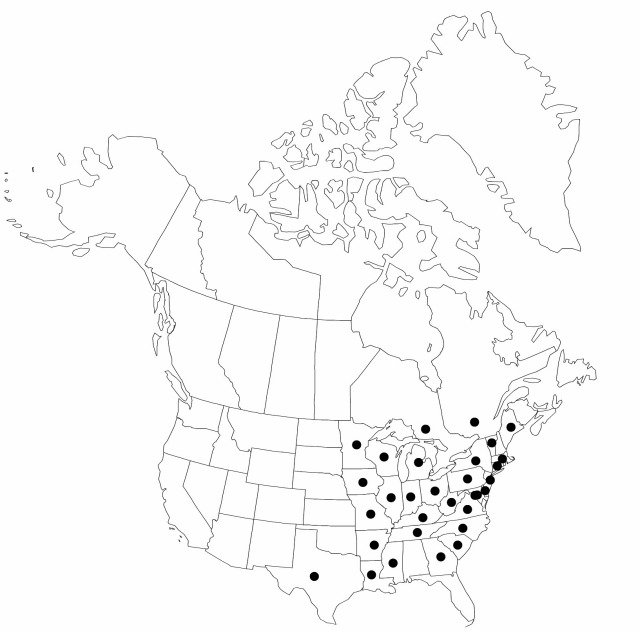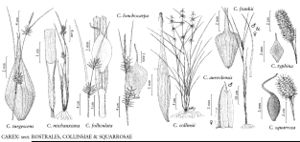Difference between revisions of "Carex typhina"
Fl. Bor.-Amer. 2: 169. 1803.
FNA>Volume Importer |
imported>Volume Importer |
||
| (3 intermediate revisions by 2 users not shown) | |||
| Line 8: | Line 8: | ||
}} | }} | ||
|common_names=Carex massette | |common_names=Carex massette | ||
| + | |special_status={{Treatment/ID/Special_status | ||
| + | |code=F | ||
| + | |label=Illustrated | ||
| + | }}{{Treatment/ID/Special_status | ||
| + | |code=E | ||
| + | |label=Endemic | ||
| + | }} | ||
|basionyms= | |basionyms= | ||
|synonyms={{Treatment/ID/Synonym | |synonyms={{Treatment/ID/Synonym | ||
|name=Carex typhinoides | |name=Carex typhinoides | ||
|authority=Schweinitz | |authority=Schweinitz | ||
| + | |rank=species | ||
}} | }} | ||
|hierarchy=Cyperaceae;Carex;Carex sect. Squarrosae;Carex typhina | |hierarchy=Cyperaceae;Carex;Carex sect. Squarrosae;Carex typhina | ||
| Line 36: | Line 44: | ||
-->{{#Taxon: | -->{{#Taxon: | ||
name=Carex typhina | name=Carex typhina | ||
| − | |||
|authority=Michaux | |authority=Michaux | ||
|rank=species | |rank=species | ||
| Line 50: | Line 57: | ||
|publication title=Fl. Bor.-Amer. | |publication title=Fl. Bor.-Amer. | ||
|publication year=1803 | |publication year=1803 | ||
| − | |special status= | + | |special status=Illustrated;Endemic |
| − | |source xml=https:// | + | |source xml=https://bitbucket.org/aafc-mbb/fna-data-curation/src/2e0870ddd59836b60bcf96646a41e87ea5a5943a/coarse_grained_fna_xml/V23/V23_971.xml |
|genus=Carex | |genus=Carex | ||
|section=Carex sect. Squarrosae | |section=Carex sect. Squarrosae | ||
Latest revision as of 20:44, 5 November 2020
Plants cespitose, short-rhizomatous. Culms 30–80 cm. Leaves 3.9–8.7 mm wide, glabrous. Spikes (1–)2–4(–6), erect; lateral spikes usually pistillate; terminal spike gynecandrous; staminate portion 4–11 × 1–3.5 mm; pistillate portion oblong to elliptic, 10–43 × 10–16 mm. Pistillate scales 2.3–5.5 × 1.2–1.7 mm, apex acute, sharp or blunt, hidden by perigynia. Staminate scales 4.2–5.8 × 1.4–2 mm, apex acute, sharp or blunt. Perigynia appressed-ascending, the proximal not reflexed, 5.5–7.8 × 2–3 mm, smooth; beak 2.3–2.9 mm, often sparingly scabrous. Achenes sides often concave, 2–2.6 × 1.4–1.7 mm, 1.2–1.9 times as long as wide; style deciduous, straight.
Phenology: Fruiting summer.
Habitat: Wet woods
Elevation: 0–1000 m
Distribution

Ont., Que., Ark., Conn., Del., D.C., Ga., Ill., Ind., Iowa, Ky., La., Maine, Md., Mass., Mich., Minn., Miss., Mo., N.J., N.Y., N.C., Ohio, Pa., S.C., Tenn., Tex., Vt., Va., W.Va., Wis.
Discussion
Carex ×deamii F. J. Hermann is a sterile hybrid described as a cross between C. shortiana Dewey and C. typhina (F. J. Hermann 1938). See comments under 407. C. shortiana.
Selected References
None.
